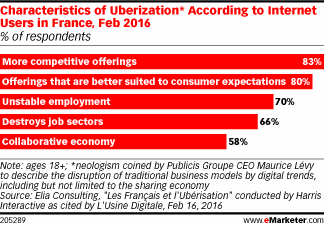Like most advanced digital societies, France faces “uberization.” This term, coined by Maurice Lévy, CEO of Publicis Groupe, refers to the fundamental disruption of traditional business models by digital trends—in Lévy’s words, the idea that “you suddenly wake up to find your legacy business gone.”
Thanks to Uber itself, as well as companies such as Airbnb, BlaBlaCar, Amazon and Google, the concept is widely recognized and understood by France’s internet users as well.
But what do they think of uberization? To find out, Elia Consulting commissioned a study by Harris Interactive, which polled 1,017 adult internet users in France in early February 2016. The results were published in the report, “Les Français et l’Ubérisation,” cited by L’Usine Digitale.
According to the web users sampled, uberization does have significant consequences. Some are clear benefits; 83% of respondents said it led to more competitive offerings, and 80% said it produced services better suited to consumer expectations in many areas. For more than half (58%) of web users it represented the sharing economy, in which individuals collaborate to achieve their goals. Overall, 64% of consumers said this kind of transformation was a good thing.
But there are major downsides, as well. Among working professionals, 47% said uberization was essentially a bad thing. In total, seven in 10 respondents acknowledged that the trend made employment more precarious for many people, and 66% agreed that it might destroy entire job sectors.

This disruption is large-scale, too, reaching many parts of the economy. Taxis and other transport providers may have grabbed most of the headlines in this regard, and 81% of web users said this was an industry very much affected by uberization. But 57% said the hotel business was impacted, and 42% mentioned retail. More than one-quarter of respondents also said banking and finance, telecoms and media firms stood to lose.
It’s not clear how traditional businesses can respond to the threat of nimble, digitally empowered competitors. In the UK, London’s black cab drivers have been struggling for some time to compete with Uber—with little success. But in February 2016 it was announced that all black taxis will be obliged to accept payment by credit card and contactless from October this year, a move in keeping with the rapid evolution of cashless payment options in this capital city.
To finance this innovation, the minimum fare in black cabs will rise 20p, but credit card firms will also cut the fees for drivers accepting cards by more than half, according to reports in The Guardian newspaper. This may not be enough to stop Uber in its tracks, but it’s a start—and a welcome change for passengers. For many of them, London cabbies’ reliance on cash has been a nuisance for years.
Source: Emarketeer







